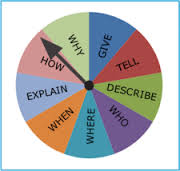In class on Wednesday Clare went over her class notes from the week before to see how we did with answering the questions that she had set for us. That was when she announced that only four of us had actually done the work. The rest of the class was told to have it done over the Easter break.


Here are what Clare and the class came up with as answers to last week’s questions:

Which of these two laptops gives the best performance?
Issues – What is performance? What does it mean? How is it measured? Lack of clarity, best? Fit for purpose? So where is the purpose?
Type of Knowledge – Numeric, scientific specification information
How – Benchmarks, experimental testing, reviews would be useful

Are virtual worlds like Second Life useful for teaching?
Issues – Depends on what you are teaching/learning, what do you mean by useful? Useful to whom? What is meant by a virtual world/what characteristics are we looking for? Question is vague
Type of Knowledge – Can depend on what you are asking? Could be a numeric result or an ‘opinion-based’ result
How – Numeric – Educational experimental approach – pre-test/activity/post-test OR Surveys/interviews with teachers/learners… Sample will almost always be biased.

Why don’t many school students (16-18 yrs old) choose to study IT at Polytechnic or University?
Issues – What is IT? Does this include ALL students or just those who go on to further study? What is many? Is this a true statement or is it just an assumption?
Types of Knowledge – Statistical records to establish how many do or don’t, words and ideas, background knowledge
How – Searching out the statistics from government sources, surveys/interviews/focus groups

Which ISP in NZ gives the best value for money?
Issues – What is an ISP? Might be different in different regions, what is ‘best value’?
Types of Knowledge – Numeric data/specification data, it depends on what best value means – but it could be opinion based
How – Comparison of specifications or survey

How do I feel about trying to work with slow internet speeds?
Issues – Define ‘slow’, define ‘trying to work’, it is just speed or also reliability of connection? It is subjective, individual perception
Type of Knowledge – Creative – words/music/art
How – Would depend on the type of knowledge

What are the main security issues associated with ‘Cloud Computing’?
Issues – Assumption that there are issues, what is meant by ‘main’? What is Cloud Computing? Huge question – probably unanswerable unless the question is scoped, needs to be more specific

Clare doesn’t believe that you would be able to answer the last question.
Point – Think about what is actually being asked. Think about the question as well as what the answer might be. A better question will provide more credible results.

Approaches – Questions to ask 
- What knowledge is being looked for? (What question is being asked?)
- Factual scientific data? Often numbers (quantitative)
- Interpretations/descriptions – words (qualitative)
- Other??
- What methods were used?
- Lab experiment
- Field experiment
- Survey
- Case study
- Interviews
- Focus groups
- Argumentative
- Secondary
- Others…??
- Was the approach/approaches appropriate?
At this point I went home as during class I had come down with a killer migraine. I couldn’t seem to concentrate and my eyesight was starting to get affected.
























